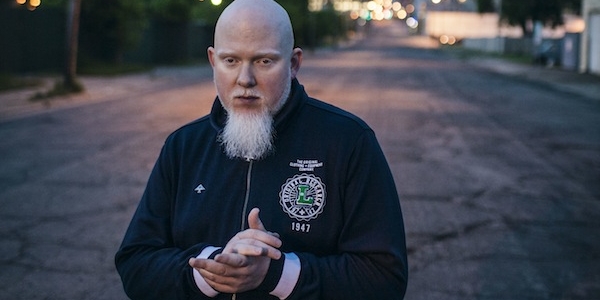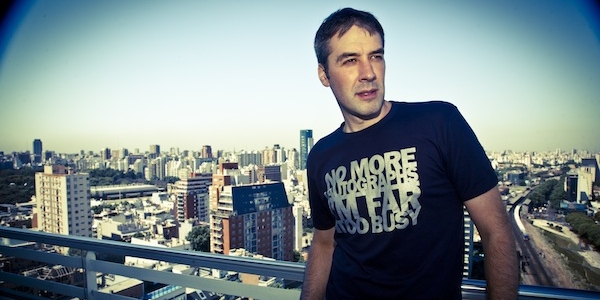We caught him at a rare moment at home in Minnesota as he takes a break from promoting new album Mourning In America And Dreaming In Color. “The response to the album has been really good, the performances have been great. When I perform I lean heavily towards new music but I do things from every album.” As someone with a solid back-catalogue and loyal fanbase, he has plenty to draw from. “I’ve been making albums for 10 years now, so there’s people that come that are fans of all the different periods, so it’s good to do stuff from all the albums.”
Harking back to the days of the classic ‘one rapper and one DJ’ formula on Mourning In America, Ali worked exclusively with prolific hip hop producer Jake One. “I like to build a momentum, a relationship with somebody. I think just getting beats from a few different people is tough, I really like to build that relationship.” While the process of developing their chemistry and the final project took place over a year, the recording was done in a matter of two months. As if he needed any encouragement to let loose, Ali and Jake drove each other on to bring the intensity in the studio. “He started making beats just for me and I think I pulled him a little in my direction and he pulled me a bit in his and I really like the result.”
Last making waves down under in 2007, the wise bearded-one is glad to be returning to our shores for a heavy hitting double bill with fellow uncompromising lyricist Sean Price. “[Last album] we didn’t end up coming to Australia, which was a big mistake. Because people have shown so much love down there and triple j has always played the stuff. I hated the fact I couldn’t come, so really looking forward to it this time.”
While it may seem like a somewhat odd combo between the peaceful Ali and the bruiser Price, the two are friends and have a history. “That’s a friend of mine and I love his music, so I’m excited to do this tour together. His music is very very street and aggressive and I think mine’s a bit more revolutionary type of stuff.”
As the chat wore on, it was clear that Ali is engaging in any form, yet in a different way to his recorded persona. As opposed to the boisterous bluesy preacher of tracks like Bitchslap! you get an equally passionate yet softly-spoken dude. Regardless of the tone, Ali has never strayed from revealing himself and his personal struggles, such as on the recent track Fajr, dedicated to his son. “All of my albums have been autobiographical. This one is not so autobiographical compared to the others though, this one is a little more political.”
The political themes of Mourning In America should be of no surprise, considering the cover depicts him kneeling on the American flag in a praying position. While he followed the recent US election circus, Ali believes true change cannot be achieved purely through electing officials – it requires action. “In my mind, what’s most important is the activism. [We need] actual movement on the ground, the grassroots, organising people on the ground and making changes. Just electing people is never going to make that happen for us. That’s what my focus is and where my attention is.”
The power of music can help inspire thought or action and for him it is a great outlet for whatever is weighing heaviest on his mind at the time. At such a politicised time, discourse and activism are his biggest concerns. “I think it’s important for people to make music about what’s important to them, whatever makes them feel an intense way about anything. So when I’m going through times of personal struggle, then that’s what my music is about. Now I think is a really important time, there are a lot of opportunities for people to come together and make change in our society.”
As important as the message is, he never loses sight of why he was drawn to hip hop to begin with. “I was attracted to it because of the music and because of the art.” The possibilities that hip hop music opens up in the form of expressing ideas and thoughts is something he believes all artists should embrace. “I think music and art should be made to address all subjects in life and all parts of life. Partying and fun and sex are all important parts of life, and there are people that express that in their music. Then you have people who make music based on other things, but there’s important space for all of those.”
Religion has been another overarching theme for the vocalist, who was rechristened Ali Newman (from original name Jason), after converting to Islam. Even as important as it is, he doesn’t feel it’s his place to convert or preach. “I don’t leave anything out but I don’t feel like the purpose of my music is to each of try to convert people to Islam, or even teach them what Islam is necessarily. I think all parts of my life should be present in my music, so there’s a presence there and I feel like that’s important. We should put all of ourselves in our music.”
Through his music and his personal life, Ali juggles all of his concerns and responsibilities. With a son and daughter at home, his drive has increased, yet making the time to actually see them has been one of his greatest challenges. “It’s a constant struggle to try and balance, with family that needs me here but also this work I love. This is how I feed my family and provide for my family. It’s always a struggle.”
As his kids continue to grow he will also have the concern of enrolling them into the American school system, one he has been openly critical about. “I think it’s very very limited. There’s a lot of mediocrity, there’s a lot of waste. I don’t think the education system is very good.” Through his parenting and leading by example he is hoping to help steer them in a direction he believes is more beneficial.
Staunchly independent, he has remained on the fringes of another archaic system, the major record label system. As the model continues to change, he sees power going back to the people. “I don’t think the big record labels are ever going to be able to get the stranglehold they had on the industry again.”
BY ANDREW ‘HAZARD’ HICKEY

